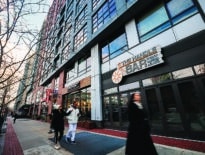
Boston Global Investors’ 10 World Trade life sciences tower under construction in Boston’s Seaport District earlier this month. Photo by James Sanna | Banker & Tradesman Staff
There was an unmistakably celebratory vibe to Mayor Michelle Wu’s big “budget breakfast” the other week.
The mayor got a round of applause from the assorted city workers, city councilors and others at the event after announcing that Boston – for the ninth year in a row – had been awarded a triple A bond rating from both Moody’s and Standard & Poor’s.
Speaking to reporters after the breakfast Ashley Groffenberger, the city’s chief financial officer, went on to say she sees no reason to think that city tax revenues will “fall off a cliff in any dramatic fashion.”
Groffenberger went on to say, per the Boston Globe, “if there is any softening in the commercial space” – yes, that’s right: if! – that she was hopeful companies would flood back into the city, lured by a reduction in rents.
With all due respect, one wonders whether Groffenberger is living in the same world as the rest of us, or at least those with day-to-day contact with the world of business and real estate and development.
For given the ominous developments in the downtown Boston office market, the happy talk of new “investments” by Wu and city department chiefs in various and sundry city programs had a decidedly unreal feeling to them, as if one were watching the passengers of the RMS Titanic party on, blissfully unaware of the iceberg looming ahead.
There is no longer a question of whether there will a “softening” in commercial space. The downturn in the office sector, driven primarily by the shift to remote work, is already here, with the market awash in a vast and growing amount of empty space of the likes not seen since the Great Recession.
The office market is likely to get a lot worse before it gets better, with occupancy numbers – the actual amount of space filled each day by office workers – much higher than the also-very-high vacancy number, which measures the amount of space officially on the market.
While the office vacancy rate is approaching a recession-like 20 percent in Boston, the occupancy rate is in the 50 percent range, especially in older, class B space, providing a preview of where those already high vacancy rates may be headed in the next few years if the worst comes to pass and tenants look to cut overhead and give back space they aren’t actually using.
Trouble Looms Over Paradise
Unable to pay their bills, some office building owners and investors have already begun to throw in the towel, particularly in New York, defaulting on their loans and giving their properties back to their lenders. Will an office tower that no one wants to rent retain its value over a process like this? Don’t hold your breath.
Of course, the impact on the real estate market – and the massive property tax revenues it generates for city coffers – is not apparent yet, mainly because those increasingly dire office market conditions that we are seeing have only become apparent in the last six months or so.
But here’s the thing: Boston’s tax base does not have to fall off a cliff for the city to start running into some serious problems paying its bills.
Rather, the Hub has relied heavily on new growth in tax revenues stemming from new development projects for the past two to three decades to pay for annual increases in the city budget.
Those increases – Wu’s current proposed budget calls for a nearly 7 percent increase in spending – foot the bill for everything from raises for city workers to affordable housing programs.
Healthy Development Creates Healthy Budgets
But starting in mid-2022, construction of new apartments and condominiums started to plunge across the city, with a drop off now in construction of commercial and lab space as well.
Hints of this creep in at the edges when you look under the hood of Wu’s budget. The annual increase in property taxes thanks to new growth is projected to be only $60 million, the lowest it’s been in years.
It’s that growth in new tax revenue, driven primarily by new real estate projects, that Boston has relied upon for years. And it could plunge to levels not seen in decades come 2024, 2025 and 2026. Who wants to build a new office or lab building in a market like this? And who can afford to build multifamily housing in an interest rate environment like this?

Scott Van Voorhis
Of course, there was no mention of any of these unpleasant realities at the mayor’s recent budget breakfast, with the rhetorical fare decidedly sunny.
In fact, there was nary even a mention of the role new development and construction plays in providing the kind of financial stability and flexibility that Boston mayors for a generation have enjoyed.
Rather, the city’s excellent bond ratings, which mainly reflect the work of past administrations, were attributed to fiscal “prudence,” not tax base growth.
Pam Kocher, head of the business-friendly Boston Municipal Research Bureau watchdog group, blessed this particular budget as “fiscally responsible,” according to the Globe.
But at some point, real estate reality will catch up. And until then, the current denizens of Boston City Hall will be celebrating – and spending – like it’s still 2019.
Scott Van Voorhis is Banker & Tradesman’s columnist; opinions expressed are his own. He may be reached at sbvanvoorhis@hotmail.com.






